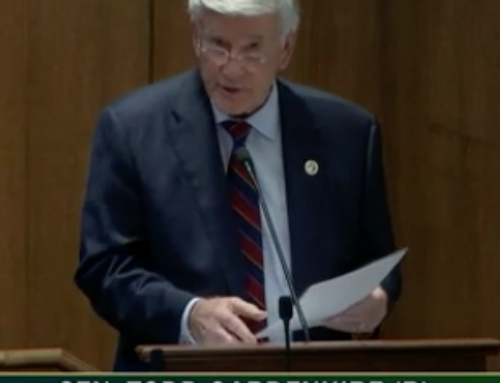Senate version of a bill to allow electronic meetings has more safeguards
Senate and House committees passed bills today that would amend the Open Meetings Act to allow members of governing bodies to participate in meetings electronically and bar the public from attending during the coronavirus outbreak.

The Senate and House bills have some differences.
Tennessee Coalition for Open Government, and other citizen and media groups, had advocated for a set of safeguards in the legislation to protect against potential abuse.
The Senate version incorporated those safety mechanisms.
For example, the Senate version would limit the business taken up at such meetings to essential business and business that a governing body determined could not be reasonably delayed.
“(5) A governing body meeting under this subsection (e) is limited to taking up essential business and shall not conduct business that can be reasonably delayed, in the judgment of the governing body, until after the state of emergency ceases to exist.”
Senate version requires governing bodies without technology for public electronic access to make ‘reasonable efforts’ to get it
Both bills says that governing bodies must provide electronic access, such as a live-streaming on the Internet, to a meeting in which the public is barred from attending if they have capability to do so. But the Senate version has an extra provision that says the governing body must make “reasonable efforts” to acquire that technology or capacity. In both bills, if the governing body doesn’t have the capability, it must make an audio or video record of the meeting and make it available to the public no later than 48 hours after the meeting, and preserve it for at least 1 year.
Another provision in the Senate bill, which is not in the House bill, says that the governing body cannot bar the public except when there is a state of emergency declared by the governor (as there is now related to coronavirus.) The House version allowed the governing body to call a state of emergency for purposes of limiting the public and allowing electronic participation by governing body members.
Both the House and Senate versions say that the notice of the meeting must include instructions on how the public can electronically access the meeting. The Senate version goes a step further and says the “governing body must publish or place the notice in a place that the governing body reasonably believes the public would be able to view the notice.”
This may mean that posting on the courthouse door during a pandemic when many people are self-quarantining probably wouldn’t suffice.
Both bills have a repeal date of Feb. 15, 2021.
Next step is floor votes; bills must match before becoming law
The changes to the law are major, and will lead to unprecedented changes to how governing bodies across the state are allowed to meet through the end of the year.
Currently, the law allows only members of state boards and commissions to attend a meeting electronically when there is a necessity documented. No law allows local governing bodies to meet in this manner. And no provision in the Open Meetings Act allows the barring of the public from a meeting entirely — or outlines what must be done if the public is not allowed to attend during a pandemic.
The Open Meetings Act statute says: “All meetings of any governing body are declared to be public meetings open to the public at all times.”
The next step on both bills is that they will head to their respective house floors.
Senate Bill 2897 with the amendment drafting code 17331, sponsored by Sen. Paul Bailey (R-Sparta) is No. 8 on the regular calendar for the 2 p.m. Senate Floor Session. After adding the amendment, several senators signed onto the bill, including Senators Rusty Crowe (R-Johnson City), Steven Dickerson (R-Nashville), Frank Nicely (R-Strawberry Planes), Shane Reeves (R-Murfreesboro), Steve Southerland (R-Morristown), Dawn White (R-Murfeesboro), Ken Yager (R-Kingston) and Jeff Yarbro, D-Nashville.
The House version, House Bill 2815 sponsored by House Speaker Cameron Sexton, R-Crossville, and Rep. Chris Todd, R-Madison County, is scheduled for the House floor session at 9 a.m. Thursday.
Both the House and Senate version must match before they can be passed into law and sent to the governor for a signature.
Unquestionably, the speed with which these bills were put together and moved through committees was unusually fast, due to the General Assembly itself trying to finish only essential business so it can shut down because of the coronavirus epidemic.




